In this episode of Your Digital Reputation, Roger Christie welcomes a very special guest in the studio for our final guest episode of 2023. Someone regularly held up as best practice and whose LinkedIn journey has been followed by millions. And the timing couldn’t be better. Propel has just released its second Digital Reputation Report, looking at the ways our most senior public servants use LinkedIn as a strategic communications tool. The results reveal there are public sector leaders who have absolutely grabbed the LinkedIn opportunity with both hands, but the findings also reveal there are many others who still stand to benefit by being more visible online. So, who better to join me in the studio and unpack this topic than the former NSW Minister for Digital Government, Board Member for the Tech Council of Australia, Chair of Minister Gallagher’s Digital Identity Panel and Minister Shorten’s MyGov Advisory Group and co-founder of ServiceGen, the Honorable Victor Dominello.

Roger Christie: Perhaps as we set the scene for all that, I want to go back a few years. And you became the member for Ryde back in 2008 and community obviously sits at the core of local politics. And I’m interested to know, was that community connection the natural driver for you to take an interest in social media?
Victor Dominello: No, in the sense that I didn’t really want social media initially. When it came about, I was thinking, “What’s this new thing?” You’re always busy in the office. There’s always something new on the horizon. It was only when my staff said to me at the time, “Look, you really have to start putting more effort into this. This is starting to grow. It’s going to take off.” I thought, OK, I’ll start dabbling with it. And then I realised actually there was a real potential here to communicate to an audience that ordinarily I couldn’t reach.
… I was a reluctant participant, and most politicians would have been back then, like, you’re so busy. You’ve always got meetings, letters, emails, phone calls, events, and there’s another channel we have to deal with. At then, most politicians, including myself, would have thought, “Geez, what else do we have to do now?”
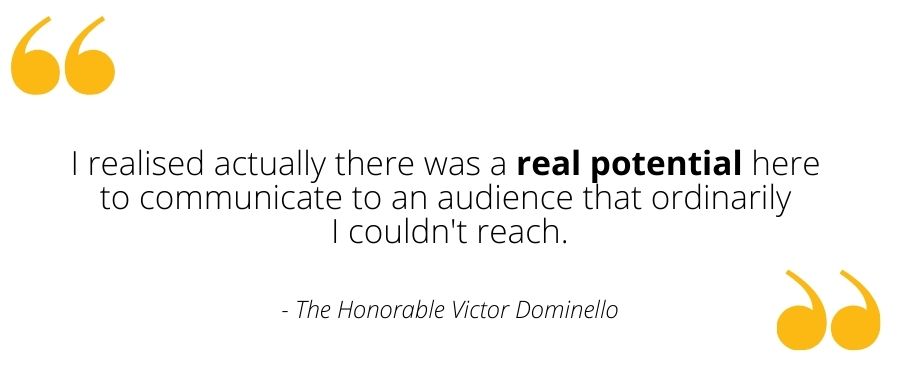
Roger Christie: And what’s interesting about that … if I knew that was your origin, your starting point, and if I look at the way that you use social media today, what I find interesting is there’s a real human, authentic approach to the way you do it, which doesn’t strike me as someone who is initially reluctant. …Why did you decide to bring your background into things, your personal passions and even many stories involving your mum? Why is that part of your social media approach?
Victor Dominello: It’s who I am. I don’t have a social media approach and a non-social media approach. I just say it as it is, to be honest. It’s really hard to put on a mask. It’s really hard work. So the best thing to do is be you. I tend to do that. So when I’m having meetings with people, I’ll talk about my mum. … I was catching up with mum the other day and she had an issue with this and she represents a cohort of people. If you’re authentic, if you’re true to yourself, then people can see that. People aren’t mugs. And I think people relate to that as well. I say, “OK, I can relate to this bloke. He’s got struggles, he’s got challenges, he’s got frustrations, he’s got family.” So I think that’s the important part of it.
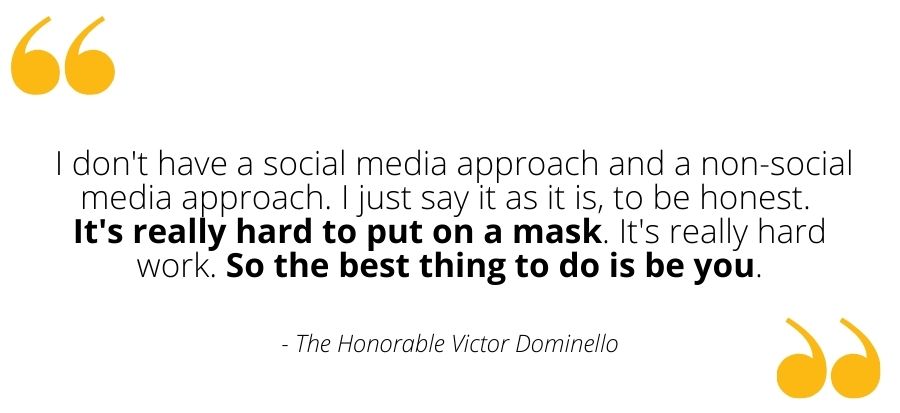
Roger Christie: Consistency, that’s the word that strikes me. We talk about consistency and symmetry, online or offline, being the same person. I agree with you. I think people sometimes do try to put that mask on particularly in the online. And it’s exhausting because you’re then trying to keep up a facade forever. And even if you think about it at a really tactical or granular level, the example, the obvious example is if someone’s writing content for you all the time, that person’s job is to maintain a consistent voice. Now, if that doesn’t gel with your offline voice and conversation, it makes it really hard and tiring.
…I want to pick up on one specific post that you wrote a little while ago. It was actually your final speech to parliament and you shared it on LinkedIn. And you started by quoting the book of Luke Chapter 12:48, where it says, “To whom much is given, much will be required.” And you then referenced your failures. You recognised your family, your colleagues, your community, and you acknowledged that you’re an almost invisible speck in space and time. And you also included, importantly, your Batman cufflinks in the photo. So contrary to how many other leaders view social media, this sort of self-serving, chest-beating, ‘I-can-pretend-to-be-something’ environment, you appear incredibly intentional in recognising and celebrating others and never putting yourself on a pedestal. In fact, you almost humble and humanise yourself.
Victor Dominello: Why? Because we are just specs in space and time. That’s the reality. Particularly in politics, you get a very privileged position. You have people coming up and asking you all the time. You’re always in the VIP section. It’s very easy to get swept away with all of that, but the reality is we all end up as part of the soil. So I think it’s just healthy to remember where we are in space and time and just to do our bit, that’s all.
Roger Christie: And I think that ethos is interesting because then if you take that into the social media environment, your ears are tuned to listening and hearing feedback from others. You’re not seeing yourself separate and above, you’re seeing yourself as a participant in the community.
Victor Dominello: No, I’m part of the tribe. I love the tribe I’m part of. This tribe that wants more improvement when it comes to government service delivery. I love being part of that tribe. I would often joke, if our tribe had a conversation at a dinner party, we’d be talking all night. But if I go and have a conversation with a normal group, they think I’m boring. But our tribe wants to change the world. I love it.
Roger Christie: And through social media in particular, you get this kind of unlimited access and unlimited scale.
Victor Dominello: Yeah, and inspiring people as well, and seriously smart people, particularly in social media and LinkedIn. Super, super bright people, very constructive in their feedback. I can’t respond to everything, but I definitely read everything. And the amount of times I think, “That’s a damn good idea. How can I feed that into something further downstream?” So it’s been a very two-way relationship. I’m the beneficiary of it in many ways.
Roger Christie: And I love that mentality. And I think that’s a great kind of segue point to our Digital Reputation Report, which we just put out recently, because in that we did find some interesting things about the level of visibility, broadcast, and participation amongst leaders. Of the 100+ public sector leaders we looked at, 65% had a LinkedIn profile. But 45%, nearly half of those were dormant in the analysis period over six months.
And in fact, just 36% of all leaders had posted within that six-month window. And 20% of all the leaders analysed contributed 96% of all original posts. So what that says to me is 80% contributed 4%. So you can see the lion’s share is going there. And for me, the most important finding of all, and this ties in beautifully with your own example, the report showed that human posts generate seven and a half times more public engagement than work posts for those senior public servants. Yet, leaders are 13 times more likely to talk about work than human issues. Why do you think that is?

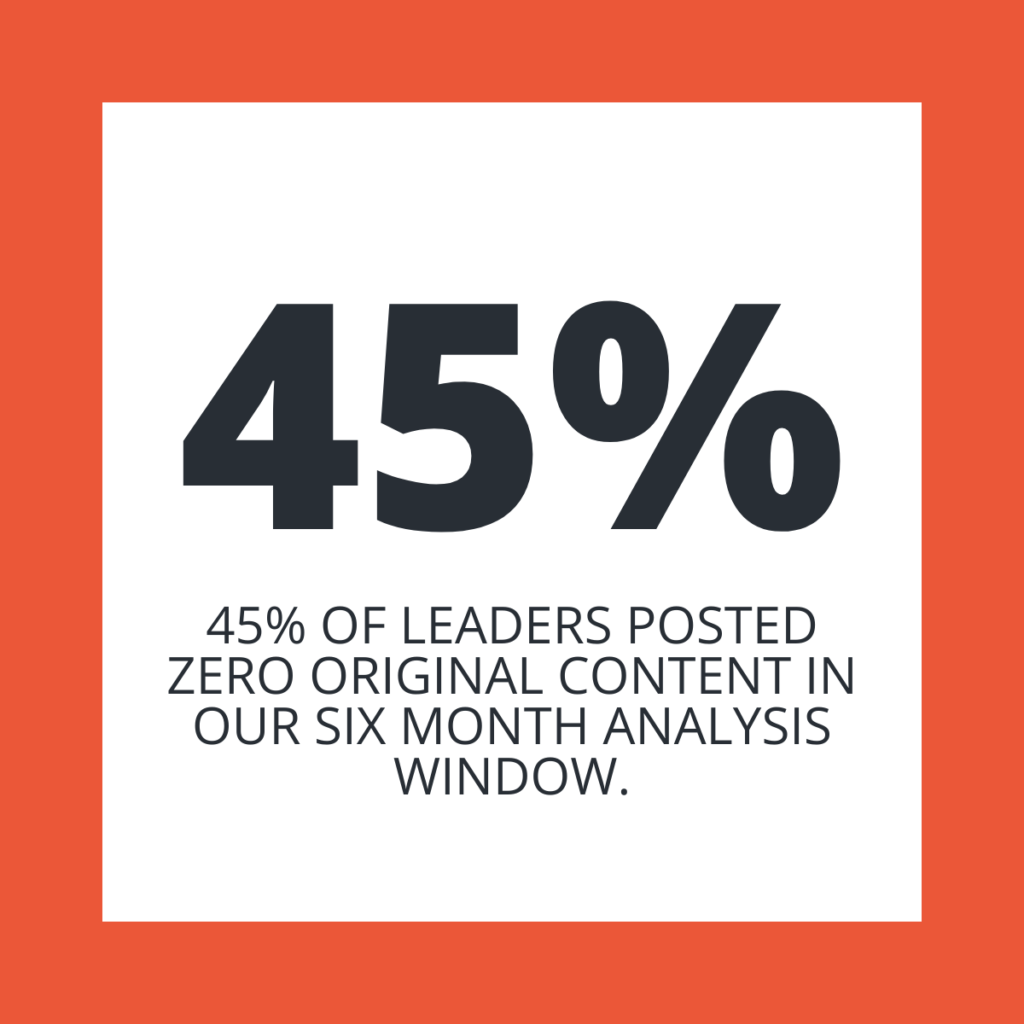


Victor Dominello: Well, it’s safe. When you’re talking about work, guardrails in place, this is what you’re talking about. When you’re talking about work, it’s harder to be vulnerable in many ways, because then you’re going to have to show the books and say, this is a failure, right? And that’s why people don’t talk about their vulnerabilities when they’re in work mode. It’s just, this is what we’re doing, here’s the standard script, bang, bang, bang, and anybody can write that script. But when you’re talking about yourself, then you’ve got to open up a bit. You’ve got to share a bit about yourself, and that’s harder.
Roger Christie: How do you walk that fine line between while still talking about work or professional things and bringing your personal story and finding that fine line? Can you be too personal? Is there risk involved there?
Victor Dominello: Yeah, there is risk involved there. That’s a really good question. You do you, ultimately. You’ve got to find out where you feel comfortable. I remember writing a post about when I went through a bout of depression, when my dad passed away, and that was quite personal. I thought I’ve got this group of people that I want to share things with. And if there’s somebody that can get benefit out of that, well then I’m hopefully helping somebody else out. But that’s not for everyone to share that type of information.
What I try to do is I just live life like everybody else. I catch the train like everybody else. I have frustrations like everybody else. I see a paper form. It’s not like when you’re a minister, they get rid of all the paper forms. I still have to fill out the damn things. It frustrates me probably more than most because I realised back then, I actually had an ability to do something about it. So when I saw this wretched process, I’m thinking, “You idiot, do something about it.” But then ultimately it all boils down to priorities because you can’t change everything. That’s the hardest job, identifying what you’re going to change.
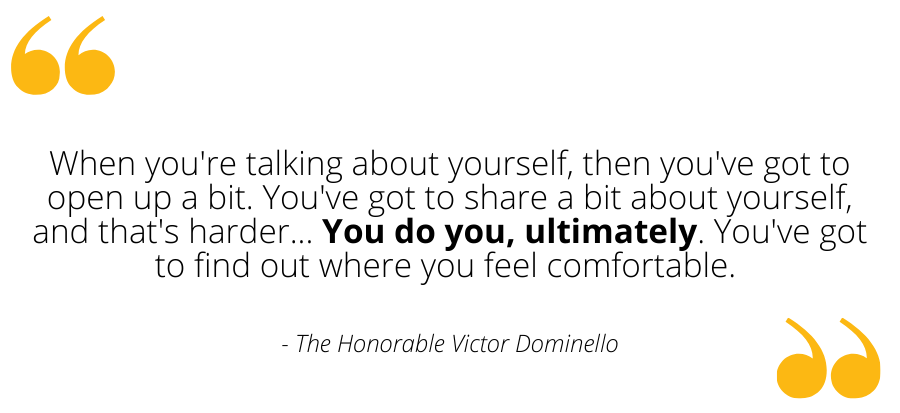
Roger Christie: But knowing that you’ve got this essentially extension of any internal thoughts you have, I know that there’s a community out there of people who are smart and have their own experience, their own expertise, and they can share, as you were saying before, these ideas to solve some of the complex problems that we can’t do on our own. And you’ve got that tribe, as you were talking about, there as a bit of a sounding board and people who contribute ideas. But knowing that you’ve got this essentially extension of any internal thoughts you have, I know that there’s a community out there of people who are smart and have their own experience, their own expertise, and they can share, as you were saying before, these ideas to solve some of the complex problems that we can’t do on our own. And you’ve got that tribe, as you were talking about, there as a bit of a sounding board and people who contribute ideas.
Victor Dominello: I’ll give you a most recent example, and this was after my political life. I was coming back from overseas and fill out the passenger declaration, a paper that you can barely read. So some of the comments were, “I don’t even carry a pen anymore”. I was thinking, “You’re right. I had to borrow a pen.” I didn’t put that in the post, but I thought, well, that’s damn right. And then somebody wrote, the reason they tried to do it in Australia, but it’s too hard. It’s just too hard. Then somebody else wrote, “Oh no, they’ve just done it in New Zealand.” So I’m thinking, “Great, let’s have a look at New Zealand.” So that then led me to a chain of inquiry in New Zealand. So it’s that type of input that I think, wow, particularly as a minister or somebody in leadership. There are a whole lot of ideas out there, new avenues, new doors to open that the LinkedIn community in particular are very good at.
Roger Christie: I want to come back to the point you made also about ‘you do you’, because I think that’s a really simple but important message. If we’re talking to leaders and they feel uncomfortable about being overly vulnerable or overly personal, I think ‘you do you’ is a great mantra because, again, consistency. If there are certain things that I wouldn’t share in a room of people or at a town hall, why would I then share them online and vice versa?
A couple of examples come to mind from the report. Kiersten Fishburn from the NSW Department of the Planning Environment shared about her breast cancer experience and treatment (click here to read the post). Some people would be terrified to share that experience and that’s fine. She obviously felt, as you’ve just said there with your depression example, if this can help someone else who might be going through it, here is a platform that I have to be able to impact thousands if not more people and give them a sense of encouragement. Give them hope. Why wouldn’t I take that opportunity? Now, if you’re not comfortable with that level of personal and vulnerable, that’s fine.
And Susan Pearce at NSW Health shared that wonderful post, which is just her with Dr. Kerry Chant at the time that the vaccine had been approved to be rolled out. They’re standing behind a cake and there’s a big sense of relief on her face. You get that human connection. This isn’t her saying, congratulations, it’s the anniversary of the vaccine rollout. This is her saying, “look at the relief on my face as this is finally, that particular barrier has been jumped over.” So I just think people can find their own level of personal. It doesn’t have to be overly revealing.
Victor Dominello: And it’s like me with the Batman cufflinks, right? I drive everyone mad. Everyone in my office knows I am a Batman, or more importantly, Dark Knight, tragic. I put it in everywhere I can. It’s because I do that in my real life, not just in social life. I do it consistently throughout.
Roger Christie: I’m the same with socks. So I know we can’t see the socks today, but I’m wearing my fancy socks because I think they’re brilliant. You’ve got to have those individual elements of personality. Exactly. One of the things you’ve touched on earlier and I think coming through this conversation, there’s really intentional effort here and it comes naturally. I get that sense but there’s effort and there’s time involved and I’m sure people listening are going, ‘That’s great for Victor. I don’t have the time or I can’t fit it in with all the different engagements, the letters, the events, whatever it is that I’ve got to be doing.’ At the height of your political roles, you still found time to do this. How did you manage to stay visible and active on LinkedIn?
Victor Dominello: I made time because it was such an important medium for me. I was never one of those super high profile ministers, like a health or an education or police or transport, they have all the big mega budgets. When I try to pitch a story to one of the TVs or the papers or whatever, traditional media, it was much, much harder to say, ‘Here’s a damn form and we’re going to fix this pain point.’ That’s not very sexy, to be honest. But when I was complaining about this frustration on LinkedIn, it was amazing how the tribe spoke and said, ‘Yeah, we want this fixed and now, like yesterday, and keep going hard.’ So I realised that I could get a little bit of media here, but I could actually tell the story here far more effectively and more importantly, a lot more input coming back. That was so valuable for me. I made time because that was it for me.

Victor Dominello: There are three things you have to do, from my perspective at least, as a leader. One, you’ve got to help set the vision because you stand on the shoulders of giants. So you get to see where the blue sky is, where the storm clouds are and therefore you have an obligation to help. If you’re not good at vision, have an obligation to at least help frame it up.
The second thing you’ve got to do is you’ve got to make sure that the vision gets implemented. Otherwise, it’s just a dream, or a nightmare, as the case may be. So make sure your thing gets implemented.
Then the third thing is to communicate both the vision and the implementation. It’s working. It’s not working. It’s a pilot. We’ve got to fix it. People want to know where this journey is going, and they want to be part of the journey it was. I would want to be part of the journey. So you make time. It’s an important part of any lever in my view.
Roger Christie: I’ve got the words of Martin Stewart-Weeks ringing in my ears, this idea of small stories connected to the bigger agenda. As you’ve described there, the challenge with mainstream media is the big ideas, the big moments, and for sure, that’s an opportunity. But as you were saying, taking people on the journey with you and communicating that implementation, the things that work, the things that don’t, the things you need help with – those small stories, that drip, drip, drip approach – that builds visibility, connection, and ultimately builds that trust with key audiences.
That’s actually a nice way to connect to your current venture, ServiceGen. It’s very much focused on helping governments build citizen trust, but through service excellence, or what might be considered competence, doing our job well. How important is it for sector leaders in particular to also showcase their warmth in building trust with key audiences around those transformation programs and agendas? And what role does LinkedIn play there?
Victor Dominello: It’s critical. The thing that I always struggled with when I was growing up was the chicken and the egg, i.e. the two massive levers of humanity is education and health, right? But which is more important? I’ve resolved that it is education. And why is it education for me? It’s because doctors need to be educated. You can’t have the best health unless doctors are educated. So education is the number one pillar. And that’s why I want ServiceGen, to first part of your question, to focus on that, helping build capability in the public sector so that when they are on that digital journey, that transformation journey, they can really embrace it because we know how hard it is. We’ve got a lot of scar tissue, so we can share those. And I think when I talk to senior public servants, I do say, you need to have that warmth. You need to be Empathetic. Think about the classic components of an argument. It’s logos, pathos, ethos. You’ve got to have the logic. You also have to have the empathy.
Roger Christie: If you don’t have the empathy, then there’s no stickiness to it. It’s just transactional. I think leaders need to be rich with empathy. That’s a really nice way of breaking it down because if I look back at the way that I’ve interpreted your content, there is a lot around that empathy and as you said, sharing your frustrations and sharing the things that haven’t worked and even things that might be a byproduct of previous leadership and looking at that through a human experience and saying, ‘No, this isn’t appropriate. The passenger card, we can do better,’ kind of thing and sharing that experience. So I completely agree. And I suppose the Digital Reputation Report that we’ve done and your experience here is only reinforcing for me the importance of bringing that warmth into the conversation. If you’ve got to a position of senior leadership, there’s no doubt you’re capable. There’s no doubt that you’re competent technically.
Victor Dominello: Exactly.
Roger Christie: People want to see the person behind the title. They want to connect with you on a values level. They want to know what makes you tick. And LinkedIn, as you said before, is that drip, drip, drip. It’s that opportunity to regularly engage and connect and build trust with people, which I think is a really important thing for others to remember.
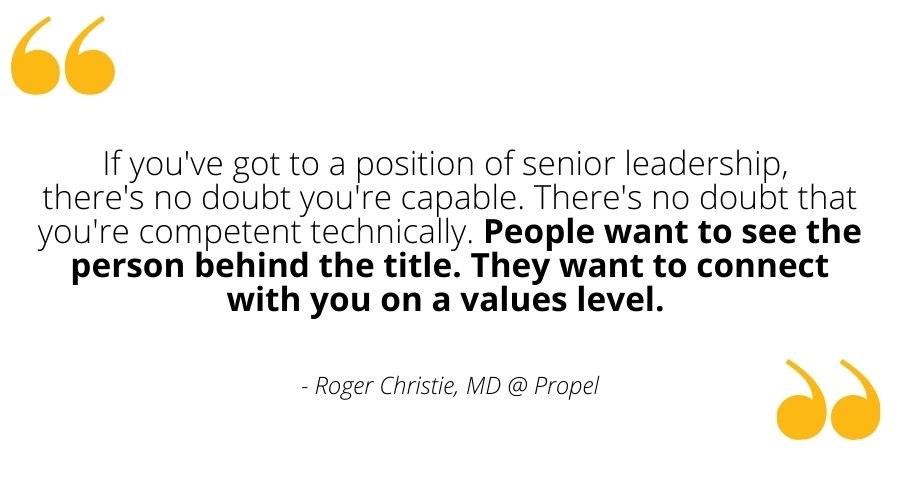
Victor Dominello: And what you said before, Roger, around consistency, I think that’s so important as well. And again, if you’re true to yourself, you’re going to be consistent. But if people say, hold it, this person’s talking about this one day and then nothing, and there’s no consistency to it, people can read through that.
Roger Christie: I think that’s actually a really good point. There’s two things I call out there. I want to come back to authenticity because that’s a bit of a buzzword that people get frustrated by. But as you were saying, if you’re regularly turning up and regularly participating in conversations, And that consistency, even if your perspective changes, you can see the change. You can see that change with visible footprints, digital breadcrumbs as we like to talk about them online.
Whereas if you just turn up for the big announcements, suddenly there can be a massive shift in your view and people are going, wait, why? Even if you’ve been reading and consuming and absorbing and that’s changing your perspective behind the scenes, if you’re there not turning up and telling people, this is how my view is now shaped or formed. All of a sudden, it’s a big surprise for them. And I think that big reveal can shock and unsettle people. But I want to come back to this idea of authenticity because, yeah, some people hate that word. And I think exactly how you’ve described it is the way it is. If I’m being authentic, I’m just being myself. You’re just being yourself.
Victor Dominello: …I was thinking about some of the posts I made. I’ve changed course a couple of times, many, many times. Sometimes I would actually write about and say in the middle post, you know what, I’ve changed my mind on this for these reasons. I used to be really steadfast on this, but on reflection, I was wrong. And I think people relate to that and say, well, good, that’s human. It’s OK to change.
Roger Christie: We should be allowed to. And then leaders set an example there too, which is a really important point. So perhaps as a final encouragement, Victor, to other leaders, if you were going to pick one or two things what would you say are the greatest benefits you’ve gained from being active on LinkedIn?
Victor Dominello: For starters, insights. Again, the insights I get back from the community are just invaluable. That’s the first thing. Second, and I hadn’t really thought about this, community. It’s actually, it’s a great community. It’s great to find your tribe. The LinkedIn community is a tribe. It’s not like I’ve got millions and millions and billions of followers. The people that are part of the platform, and I’m just one of them. It’s my name, but ultimately I’m just one of them, one of us. It’s having that sense of community. It’s good to know that you’re on the journey with other people.

Roger Christie: It’s interesting, when I looked at your final speech to Parliament post I remember thinking, what a great way to sign off if I can call it that – short, succinct. But what was really interesting, I then looked through some of the comments and I remember seeing one particular person who several months earlier had been a detractor of you and of the department. I remember thinking how interesting to see the same person who wrote quite a lengthy post criticising certain processes within government, turning up and saying, ‘You’ve been an absolute champion. Good luck.’ And little things like that.
This is it. By turning up and being ourselves, we’re not going to change all hearts and minds. But if you turn up consistently and you are yourself and you are empathetic, what social media does gives you the opportunity to access and scale that approach to leadership. And you set an example for others. And so even staunch detractors can be turned around and become fans.
Victor Dominello: But again, Roger, it’s that sense of community. It’s very lonely doing things, particularly in the transformation realm, because it’s hard. But knowing that there’s this community that are willing you on and they’re all part of the same journey. That is very precious support. It’s only when you ask the question that I’m actually starting to think about it more deeply. That would be the most important thing for me, that sense of community.
Roger Christie: I hope others hear that message, Victor, because it is. It’s a wonderful community. It’s a great collaborative community. I really appreciate your transparency, your candor, your authenticity, if I can use that word, in sharing your experience and advice with others.
And I want to say personally that I hope more people look at the way you’ve used LinkedIn as a strategic communications tool, not to build yourself up, but as you said there, to listen and learn from the community around you. I think that’s really, really important. And as you wrote in our Digital Reputation Report recently, curating an effective digital reputation is now an inescapable part of good public leadership. And after our chat today, I’m hoping that those leaders listening, they see that inescapable responsibility actually is an immense opportunity for themselves and their organisation.

Feel free to drop Roger Christie a note with any thoughts from this conversation. If you want more on all things digital reputation, be sure to subscribe below to the Your Digital Reputation newsletter. Join hundreds of subscribers from around the world already signed up!

